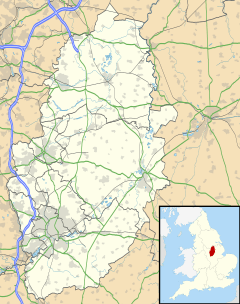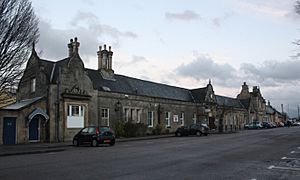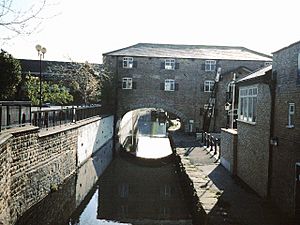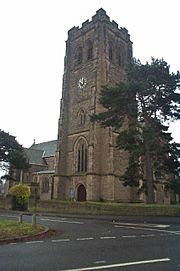Worksop facts for kids
Quick facts for kids Worksop |
|
|---|---|
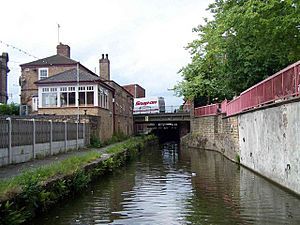 Approaching Worksop Town Lock |
|
| Population | 41,820 |
| Demonym | Worksopian |
| OS grid reference | SK 58338 78967 |
| District |
|
| Shire county | |
| Region | |
| Country | England |
| Sovereign state | United Kingdom |
| Post town | WORKSOP |
| Postcode district | S80, S81 |
| Dialling code | 01909 |
| Police | Nottinghamshire |
| Fire | Nottinghamshire |
| Ambulance | East Midlands |
| EU Parliament | East Midlands |
| UK Parliament |
|
Worksop ( WURK-sop) is a market town in the Bassetlaw District in Nottinghamshire, England. It is located 19 miles (31 km) east-south-east of Sheffield, close to Nottinghamshire's borders with South Yorkshire and Derbyshire, on the River Ryton and not far from the northern edge of Sherwood Forest.
Worksop's had a population of 41,820 as of the 2011 Census and it is twinned with the German town Garbsen.
Contents
History
Evidence that Worksop existed before the Norman conquest of England in 1066 is provided by the Domesday Book of 1086:
- "In Werchesope, (Worksop) Elsi (son of Caschin) had three carucates of land to be taxed. Land to eight ploughs. Roger has one plough in the demesne there, and twenty-two sokemen who hold twelve oxgangs of this land, and twenty-four villanes and eight bordars having twenty-two ploughs, and seven acres of meadow. Wood pasture two miles long, and three quarentens broad."
In about 1103, William de Lovetot established a castle and the Augustinian priory at Worksop. Subsequently, Worksop grew into a market town.
A skirmish occurred in the area during the Wars of the Roses on 16 December 1460, commonly known as the Battle of Worksop.
The building of the Chesterfield Canal in 1777, and the subsequent construction of the Manchester, Sheffield and Lincolnshire Railway in 1849, both of which passed through the settlement, led to a degree of growth. Discovery of sizeable coal seams further increased interest in the area.
Coal mining provided thousands of jobs in and around Worksop for most of the 19th and 20th centuries, but by the 1990s the pits had closed, resulting in high local unemployment.
Unemployment levels in the area are now lower than the national average, owing to large number of distribution and local manufacturing companies, including Premier Foods, Wilkinsons, RDS Transport, GD Engineering, Pandrol UK Ltd and Laing O'Rourke.
Transport
Air
Doncaster Sheffield Airport (formerly RAF Finningley) is approximately 15 miles (24 km) from Worksop, offering regular flights to other European countries. Due to its military past, Doncaster Sheffield Airport has a long 2,580 metres (8,460 ft) runway, and so is capable of landing wide body jets such as Boeing 747s. The Hungarian airline WizzAir continues to serve several European cities, and Thomson Holidays regularly runs charter services from there as part of their package holiday business.
Canal
Worksop is connected to the UK Inland Waterways network by the Chesterfield Canal. Although the canal was built to export coal, limestone, and lead from Derbyshire, iron from Chesterfield, and corn, deals, timber, groceries and general merchandise into Derbyshire, today it is used for leisure purposes.
Rail
Worksop lies on the Sheffield-Lincoln line, and the Robin Hood line. With Northern services running between Sheffield, Lincoln, and Leeds calling at the station, and East Midlands Railway services from Nottingham via Mansfield terminating at the station.
Road
Worksop lies on the A57 and A60 with links to the A1 and M1.
Stagecoach East Midlands operate internal services within the town, and services running out of the town toward Doncaster, Chesterfield, and Nottingham.
Religion
Officially titled the Priory Church of Saint Mary and Saint Cuthbert, is the Anglican parish church usually known as Worksop Priory. It was an Augustinian Priory founded in 1103. The church has a magnificent nave and detached gatehouse. Monks at the priory made the Tickhill Psalter, one of the finest illuminated manuscripts of the medieval period, now held in New York Public Library. After the dissolution of the Monasteries the east end of the church fell into disrepair, but the townspeople were granted the nave as a parish church. The eastern parts of the building have been restored in several phases, the most recent being in the 1970s when the architect Lawrence King rebuilt the crossing.
St. Anne's Church is an Anglican parish church and is recorded in the National Heritage List for England as a designated Grade II listed building. The church was built in 1911 by the Lancaster architects Austin and Paley. The church has an historic pipe organ originally built by Gray & Davison in 1852 for Clapham Congregational Church.
Places of interest
Mr Straw's House, the family home of the Straw family, was inherited by the Straw brothers, William and Walter when their parents died in the 1930s. The house remained unaltered until the National Trust acquired it in the 1990s and opened it to the public. Clumber Park, south of Worksop is a country park, also owned by the National Trust, and is open to the public.
The Acorn Theatre is a 200-seat performing arts venue in the town centre, providing a programme of professional and amateur live theatre and folk music. It is a registered charity managed and run by volunteers,and the building is the home of several community performing groups and a youth theatre.
The Regal Centre has been taken by local businessmen, Martin Gilfoyle, Steve Broadbent and Chris Frampton to provide live entertainment and recording studio facilities including professional live music and arts performances and arts training courses and social support services. This is Worksop's only prime entertainment venue. The Savoy Cinema was opened on 23 March 2012.
Local economy
Agricultural and forestry
John Harrison's survey of Worksop for the Earl of Arundel reveals that at this time most people earned their living from the land. a tenant farmer Henry Cole farmed 200 acres of arable land, grazing his sheep on "Manton sheepwalk". This survey also described a corn-grinding water mill (Bracebridge mill) and Manor Mill situated near to Castle Hill. There was also a kiln and a malthouse.
One unusual crop associated with Worksop is liquorice. This was originally grown in the Priory gardens for medicinal purposes, but continued until around 1750. William Camden records in Britannia that the town was famous for growing liquorice. John Speed noted: "In the west, near Worksop, groweth plenty of Liquorice, very delicious and good". White says the liquorice gardens were "principally situated on the eastern margin of the park, near the present 'Slack Walk'." He notes that the last plant was dug up about "fifty years ago" and that this last garden had been planted by "the person after whom the 'Brompton stock' is named". A pub in Worksop is now named after this former industry.
Additionally, much of the area being heavily forested, timber was always an important industry - supplying railway sleepers to the North Midland Railway, timber for the construction of railway carriages and packing cases for the Sheffield cutlery industry. The town also became notable for the manufacture of Worksop Windsor Chairs. Timber firms in the town included Benjamin Garside's woodyard and Godley and Goulding, situated between Eastgate and the railway.
Brewing and Malting
The malting trade began in Retford but gradually moved to Worksop where it became an important trade even though it never employed many people. In 1852 Clinton malt kilns were built.
Worksop has a strong tradition of brewing including being the site of the historic Worksop & Retford Brewery. This Brewery had previously been known as Garside and Alderson and Prior Well Brewery.
The brewing tradition is continued by a number of local independent breweries in and around the town, including Welbeck Abbey Brewery.
Mining
At the start of the 19th century, Worksop had a largely agricultural economy with malting, corn milling and timber-working being principal industries. However, the discovery of coal meant that by 1900 the majority of the workforce was employed in coal mining, which provided thousands of jobs - both directly and indirectly - in and around Worksop for most of the 19th and 20th centuries.
The first coal mine was Shireoaks Colliery, which by 1861 employed over 200 men which rose to 600 men by 1871. Steetley Colliery started producing coal in 1876 and in Worksop a mine was developed on land to the South East, owned by Henry Pelham-Clinton, 7th Duke of Newcastle. This mine was fully operational in around 1907, with three shafts, and was named Manton Colliery.
The closure in the 1990s of the pits, compounding the earlier decline of the timber trade and other local industry, resulted in high unemployment in parts of the Worksop area, as well as other social problems.
Textiles
In John Harrison's survey of Worksop for the Earl of Arundel, a dye house and a tenter green (where lengths of cloth were stretched out to dry) indicates a small cloth industry was present in Worksop. Late attempts during the Industrial Revolution to introduce textile manufacturing saw two mills constructed - one at Bridge Place and the other somewhere near Mansfield Road. Both enterprises failed and closed within three years. They were converted to milling corn.
Current economy
The local economy in Worksop is dominated by service industries, manufacturing and distribution. Unemployment levels in the area are now lower than the national average, owing to large number of distribution and local manufacturing companies, including Premier Foods, Wilko, RDS Transport, Pandrol UK Ltd and Laing O'Rourke.
Major employers in the area include Premier Foods, Greencore, Wilko, RDS Transport (the Flying Fridge), B&Q, MAKE polymers, OCG Cacao, part of Cargill, Pandrol, GCHQ and the National Health Service (Doncaster and Bassetlaw NHS Trust and Nottinghamshire Healthcare NHS Trust).
Education
Primary
|
|
Secondary
- Outwood Academy Portland
- Outwood Academy Valley
- Worksop College
Further education
- North Nottinghamshire College
- Outwood Post-16 centre
Notable people
|
|
Images for kids
See also
 In Spanish: Worksop para niños
In Spanish: Worksop para niños


